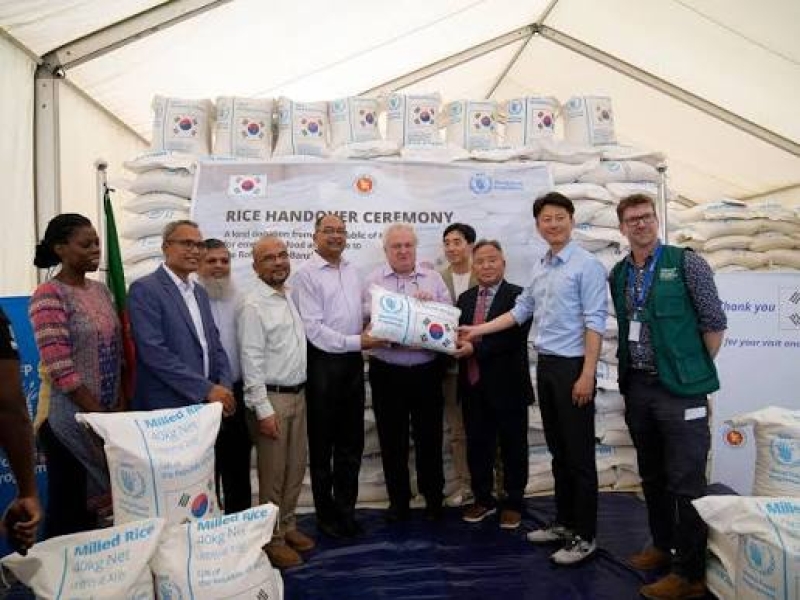- Khaleda now not fit for travelling: Medical Board |
- Panchagarh records lowest temperature 10.5°C so far this year |
- Christmas returns to Bethlehem after two years of Gaza war |
- কলাপাড়া মুক্ত দিবসে এবার সাড়া নেই কার |
- One killed, two injured in attack at Ctg meeting over marriage |
S Korea committed to working with WFP on Rohingyas

Ambassador of the Republic of Korea to Bangladesh Young Sik Park on Tuesday said they remain dedicated to working with the government of Bangladesh and WFP to respond to the growing needs of the Rohingya community.
“We are pleased to contribute to WFP’s lifesaving work in Bangladesh. Decades ago, Korea was one of the largest recipients of WFP assistance. Today, we are proud to stand on the other side – as a committed donor supporting those in need," he said.
The government of Bangladesh, the Embassy of the Republic of Korea, and the United Nations World Food Programme (WFP) held a handover ceremony for a rice donation by the Republic of Korea in support of the Rohingya response.
The ceremony took place at WFP’s Alongkar Warehouse in Chattogram and was attended by Md. Mostafizur Rahman, Secretary of the Ministry of Disaster Management and Relief; Young Sik Park, Ambassador of the Republic of Korea to Bangladesh; and Dom Scalpelli, WFP Country Director.
The event also paid tribute to Korean farmers whose hard work made contributions like this possible, as it coincided with Korea’s Farmer’s Day on 11 November.
This is the second donation – 20,265 metric tonnes – from the Republic of Korea, made through its Ministry of Agriculture, Food and Rural Affairs (MAFRA). In 2024, a 15,000 mt rice donation was also made for the Rohingya response.
In addition to rice, MAFRA this year provided fortified rice kernels, which contain essential vitamins and minerals including vitamin A, B1, B12, zinc, iron, and folic acid, all critical for health and cognitive development, especially for children.
The kernels and regular rice grains will be blended locally at a ratio of 1:100. After blending, the donation will be delivered to Cox’s Bazar, ready for distribution to the Rohingya community.
This year’s contribution is enough to feed the entire Rohingya population of over 1.1 million for nearly two months, and is part of Korea’s global donation of 150,000 metric tonnes of rice to WFP operations in 17 countries.
“We thank the Republic of Korea for being a steadfast partner in the Rohingya response. As humanitarian funding continues to decline while needs rise sharply, this contribution is both timely and vital. We urge the international community to step up support – not only to meet immediate needs but also to help us find a long-term solution for the Rohingya people,” said Md. Mostafizur Rahman, Secretary, Ministry of Disaster Management and Relief.
As the crisis enters its ninth year, the prospect of voluntary, safe and dignified return for the Rohingya population – now more than 1.1 million people – remains distant.
Since early 2024, more than 130,000 new arrivals have reached the camps, fleeing ongoing conflict in Rakhine State, Myanmar.
According to the 2025 Integrated Food Security Phase Classification (IPC) report, over 446,000 Rohingya (40%) are projected to be severely food insecure, with nearly 223,000 facing emergency-level food insecurity (IPC Phase 4).
While the needs are rising in the camps, funding is dwindling. WFP’s funding outlook for 2026 is extremely low, and without new resources, lifesaving operations will face major disruptions as early as April 2026, reports UNB.
“This generous donation from the people of the Republic of Korea is a powerful testament to their solidarity and compassion. Their journey from receiving aid to becoming a valued donor is truly inspiring. We also commend the people of Bangladesh for their unwavering hospitality and humanity. WFP remains steadfast in our commitment to both communities, but we urgently need additional support to meet the essential needs of the Rohingya and safeguard their dignity and wellbeing,” said Dom Scalpelli, WFP Country Director.
“We deeply value the Republic of Korea’s steadfast partnership with Bangladesh. Our bilateral relations, built on mutual respect and shared aspirations, continue to flourish in trade, investment, development cooperation, and people-to-people exchanges. We also express our sincere appreciation to the ROK for supporting humanitarian and diplomatic initiatives concerning the Rohingya issue,” said Md. Morshedur Rahman Talukder, Director, Myanmar Wing, Ministry of Foreign Affairs.

